If square-footage is an indication of institutional priorities, Duke’s research laboratories are more important than God and college basketball combined. And for a good reason. Laboratories are the delivery rooms of knowledge. They are where tax dollars and intellect combine to test hypotheses and improve the human condition. The lab is where overworked graduate students begrudgingly spend their lives analyzing small droplets of clear liquid with instruments that cost more than their house all in the pursuit of answers to the world’s most important questions—answers which have established the lab as the most influential space in the modern world.
The lab has, in fact, become so influential that it has recently inspired many non-scientific disciplines to stake a claim on a share of the influence. One won’t find unnerved postdocs injecting BDNF into transgenic mice in these new “humanities labs”. Instead, one is more likely to notice the lab’s catchy, unspaced name (e.g. “BorderWork(s)” and “GreaterThanGames”), and its distinctive, indistinguishable-from-a-regular-office atmosphere. The expansion of the definition of the lab by the humanities disciplines has opened up a world of opportunities for those wishing to offer their work a legitimacy only a laboratory could bestow. So stop slaving away on your term paper in the library, and start slaving away on your term paper in your brand new TermPaperLab.
Those interested in learning more should contact the directors of Lab[oratory/ies]Lab(s), the interdisciplinary laboratory aimed at the exploration of the sociopoliticoacademic definition of the word “lab” and its influence over the development of modern laboratories.
Get The Chronicle straight to your inbox
Signup for our weekly newsletter. Cancel at any time.

